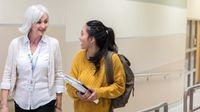https://www.edutopia.org/article/4-ways-take-real-break-summer
4 Ways to Take a Real Break This Summer
Some teachers turn downtime into a professional learning opportunity, but unplugging from work has a lot of value.

Years ago during a parent conference along with a wise, experienced coteacher, the parent asked what her son needed to work on during the summer to be ready for advanced math the next year. My coteacher calmly replied, “He needs to simply get outside and play some baseball.” To my surprise, the parent was relieved. Maybe we, as educators, need to heed the spirit of this advice for ourselves.
A typical summer for me as a teacher used to include teaching a few weeks of math summer camp, a workshop or two, and a few professional development (PD) books. Before I knew it, August was here. Yes, after a jam-packed summer, I definitely was more professionally developed but definitely not well rested. Librarian Christa Pryor spent the summer of 2020 relocating the entire school library to a new building. When I asked her what plans she had for this summer, she quickly replied, “This summer is for my family and me.” The more I ask around, it seems like many educators will be pumping the brakes on schoolwork in the summer of 2021.
After a tumultuous year of remote and/or hybrid learning, educators need to give themselves permission to rejuvenate this summer. Many educators will find it hard to break the busy summer professional development habit. If you’re dedicated to taking a real break this summer, here are a few swaps you can make to put the focus on you.
4 WAYS TO FOCUS ON YOURSELF THIS SUMMER
1. Read what brings you joy instead of educational research books: If you typically take home PD books to prepare for the next school year, swap these out for books you’ve always wanted to read. Even if a book is not considered to be highbrow, be open to this indulgence. Visit your local library, or get to know a locally owned bookshop. Curl up and let a good story take you away.
2. Seek out a new avenue for seasonal work instead of teaching summer camp or school: I have been teaching a math workshop to middle school students. Every. Single. Summer. While I love being with the kids and doing fun, creative math in a low-stakes setting, I can’t risk the burnout. Not this summer. If you count on the income of a summer school program or camp, seek out seasonal employment in the retail or service industries. This might be the summer you focus on your side hustle. By trying out a new employment adventure, you can meet new people, expand your skill base, and supplement your income.
3. Develop a hobby instead of focusing on PD: My summer calendar would be filled with education conferences near and far. It was not unusual for me to spend a few days at my regional educational service center, attend a social and emotional learning conference in another state, or participate in an online seminar. While I gained so much as an educator networking and learning at these conferences, I am taking a pause this summer. You might want to try learning how to knit, paint, cook, woodwork, or skateboard. Perhaps you’d like to start a yoga or Zumba practice.
The summer is also a great time to learn a new language or do volunteer work... or whatever piques your interest. YouTube tutorials can help you get started, or you can join an online or in-person community for peer support. Check out this short NPR Life Kit podcast for more tips on starting a hobby. Dedicate some time every day to your new hobby. You’ll be amazed at how much you will learn and grow with daily practice (and it will make for an inspirational personal story for your students when school starts).
4. Look forward to your break instead of reflecting back on your school year: As an instructional coach, I am constantly singing the praises of a reflection practice. It’s always valuable to consider what went well and what could be adjusted in your teaching practice. Try to apply your reflection practice to your summer instead. Imagine yourself in August as the summer is winding down. Do you imagine feeling refreshed? Renewed? How will you fill in the blank in this sentence? “I am so glad I did _____ for myself this summer.” Keep a daily journal in a notebook or in an app like Daylio to track what swaps you’ve made this summer to revitalize yourself. Your journal entries will guide your reflection on the gift you’ve given yourself this summer.
There will be moments this summer when your educator guilt will slip in. You’ll feel tempted to check your email or research a project for the next school year. As educators, we always say you can’t pour from an empty cup. This summer, let’s fill our cups so full that they will run over for our students when school starts again. Your fall 2021 self will be glad you did.
